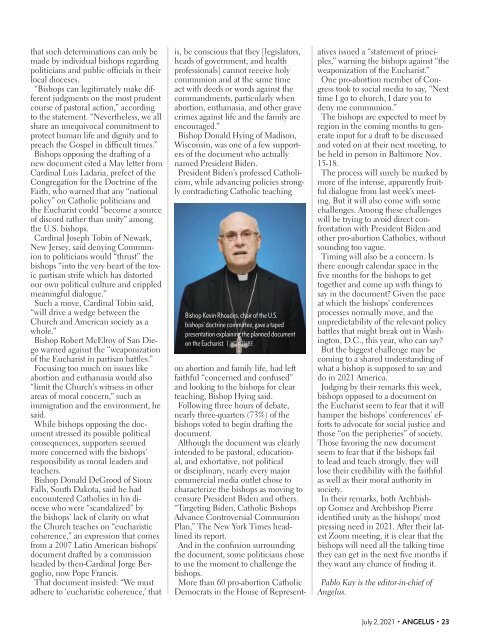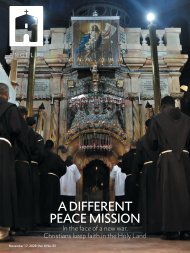Angelus News | July 2, 2021 | Vol. 6 No. 13
On the cover: For a Christian, how important is taking care of the mind? This year’s “Books Issue” has a few ideas. On Page 10, Mike Aquilina interviews Catholic convert and writer Zena Hitz on her new book about “the pleasures of the intellectual life.” On Page 14, Angelus contributors share their picks for the best new books of the pandemic. And on Page 18, Elise Italiano Ureneck reviews a groundbreaking new book by a scholar with autism who sees his condition as an intellectual gift from God.
On the cover: For a Christian, how important is taking care of the mind? This year’s “Books Issue” has a few ideas. On Page 10, Mike Aquilina interviews Catholic convert and writer Zena Hitz on her new book about “the pleasures of the intellectual life.” On Page 14, Angelus contributors share their picks for the best new books of the pandemic. And on Page 18, Elise Italiano Ureneck reviews a groundbreaking new book by a scholar with autism who sees his condition as an intellectual gift from God.
You also want an ePaper? Increase the reach of your titles
YUMPU automatically turns print PDFs into web optimized ePapers that Google loves.
that such determinations can only be<br />
made by individual bishops regarding<br />
politicians and public officials in their<br />
local dioceses.<br />
“Bishops can legitimately make different<br />
judgments on the most prudent<br />
course of pastoral action,” according<br />
to the statement. “Nevertheless, we all<br />
share an unequivocal commitment to<br />
protect human life and dignity and to<br />
preach the Gospel in difficult times.”<br />
Bishops opposing the drafting of a<br />
new document cited a May letter from<br />
Cardinal Luis Ladaria, prefect of the<br />
Congregation for the Doctrine of the<br />
Faith, who warned that any “national<br />
policy” on Catholic politicians and<br />
the Eucharist could “become a source<br />
of discord rather than unity” among<br />
the U.S. bishops.<br />
Cardinal Joseph Tobin of Newark,<br />
New Jersey, said denying Communion<br />
to politicians would “thrust” the<br />
bishops “into the very heart of the toxic<br />
partisan strife which has distorted<br />
our own political culture and crippled<br />
meaningful dialogue.”<br />
Such a move, Cardinal Tobin said,<br />
“will drive a wedge between the<br />
Church and American society as a<br />
whole.”<br />
Bishop Robert McElroy of San Diego<br />
warned against the “weaponization<br />
of the Eucharist in partisan battles.”<br />
Focusing too much on issues like<br />
abortion and euthanasia would also<br />
“limit the Church’s witness in other<br />
areas of moral concern,” such as<br />
immigration and the environment, he<br />
said.<br />
While bishops opposing the document<br />
stressed its possible political<br />
consequences, supporters seemed<br />
more concerned with the bishops’<br />
responsibility as moral leaders and<br />
teachers.<br />
Bishop Donald DeGrood of Sioux<br />
Falls, South Dakota, said he had<br />
encountered Catholics in his diocese<br />
who were “scandalized” by<br />
the bishops’ lack of clarity on what<br />
the Church teaches on “eucharistic<br />
coherence,” an expression that comes<br />
from a 2007 Latin American bishops’<br />
document drafted by a commission<br />
headed by then-Cardinal Jorge Bergoglio,<br />
now Pope Francis.<br />
That document insisted: “We must<br />
adhere to ‘eucharistic coherence,’ that<br />
is, be conscious that they [legislators,<br />
heads of government, and health<br />
professionals] cannot receive holy<br />
communion and at the same time<br />
act with deeds or words against the<br />
commandments, particularly when<br />
abortion, euthanasia, and other grave<br />
crimes against life and the family are<br />
encouraged.”<br />
Bishop Donald Hying of Madison,<br />
Wisconsin, was one of a few supporters<br />
of the document who actually<br />
named President Biden.<br />
President Biden’s professed Catholicism,<br />
while advancing policies strongly<br />
contradicting Catholic teaching<br />
Bishop Kevin Rhoades, chair of the U.S.<br />
bishops’ doctrine committee, gave a taped<br />
presentation explaining the planned document<br />
on the Eucharist. | YOUTUBE<br />
on abortion and family life, had left<br />
faithful “concerned and confused”<br />
and looking to the bishops for clear<br />
teaching, Bishop Hying said.<br />
Following three hours of debate,<br />
nearly three-quarters (73%) of the<br />
bishops voted to begin drafting the<br />
document.<br />
Although the document was clearly<br />
intended to be pastoral, educational,<br />
and exhortative, not political<br />
or disciplinary, nearly every major<br />
commercial media outlet chose to<br />
characterize the bishops as moving to<br />
censure President Biden and others.<br />
“Targeting Biden, Catholic Bishops<br />
Advance Controversial Communion<br />
Plan,” The New York Times headlined<br />
its report.<br />
And in the confusion surrounding<br />
the document, some politicians chose<br />
to use the moment to challenge the<br />
bishops.<br />
More than 60 pro-abortion Catholic<br />
Democrats in the House of Representatives<br />
issued a “statement of principles,”<br />
warning the bishops against “the<br />
weaponization of the Eucharist.”<br />
One pro-abortion member of Congress<br />
took to social media to say, “Next<br />
time I go to church, I dare you to<br />
deny me communion.”<br />
The bishops are expected to meet by<br />
region in the coming months to generate<br />
input for a draft to be discussed<br />
and voted on at their next meeting, to<br />
be held in person in Baltimore <strong>No</strong>v.<br />
15-18.<br />
The process will surely be marked by<br />
more of the intense, apparently fruitful<br />
dialogue from last week’s meeting.<br />
But it will also come with some<br />
challenges. Among these challenges<br />
will be trying to avoid direct confrontation<br />
with President Biden and<br />
other pro-abortion Catholics, without<br />
sounding too vague.<br />
Timing will also be a concern. Is<br />
there enough calendar space in the<br />
five months for the bishops to get<br />
together and come up with things to<br />
say in the document? Given the pace<br />
at which the bishops’ conferences<br />
processes normally move, and the<br />
unpredictability of the relevant policy<br />
battles that might break out in Washington,<br />
D.C., this year, who can say?<br />
But the biggest challenge may be<br />
coming to a shared understanding of<br />
what a bishop is supposed to say and<br />
do in <strong>2021</strong> America.<br />
Judging by their remarks this week,<br />
bishops opposed to a document on<br />
the Eucharist seem to fear that it will<br />
hamper the bishops’ conferences’ efforts<br />
to advocate for social justice and<br />
those “on the peripheries” of society.<br />
Those favoring the new document<br />
seem to fear that if the bishops fail<br />
to lead and teach strongly, they will<br />
lose their credibility with the faithful<br />
as well as their moral authority in<br />
society.<br />
In their remarks, both Archbishop<br />
Gomez and Archbishop Pierre<br />
identified unity as the bishops’ most<br />
pressing need in <strong>2021</strong>. After their latest<br />
Zoom meeting, it is clear that the<br />
bishops will need all the talking time<br />
they can get in the next five months if<br />
they want any chance of finding it.<br />
Pablo Kay is the editor-in-chief of<br />
<strong>Angelus</strong>.<br />
<strong>July</strong> 2, <strong>2021</strong> • ANGELUS • 23


















